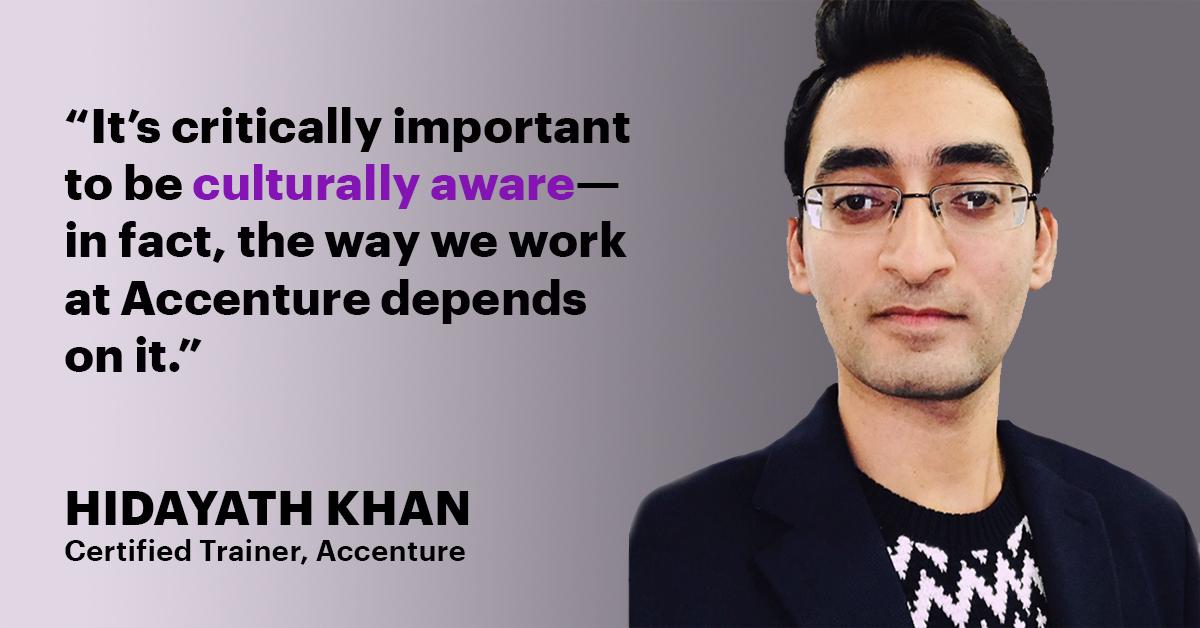How 'Culture-Smart' Organizations Say, Do and Drive a Culture of Equality

How 'culture-smart' organizations say, do and drive a culture of equality
Did you know?
- We often categorize people without even talking to them.
- Sometimes “yes” does not mean “yes.”
- Inviting a client to dinner (or not) can be a deal breaker.
Go anywhere around the world and communication styles and customs are often different from our own.
Most times, we don’t even realize that something holds us back—or leads us—to stereotype people from different cultures and backgrounds before we’ve even met them.
By respecting and accepting the individual cultures and unique backgrounds that shape us, we remove geographic boundaries. We drive innovation. And we do incredible work with our clients.
On the forefront of helping to drive a culture-savvy One Accenture, Hidayath Khan, a certified trainer at Accenture in India, explains why cross-cultural training is a business imperative—and how to make it happen.
The importance of cultural awareness
It’s critically important to be culturally aware—in fact, the way we work at Accenture depends on it.
So much of our time is spent putting teams from across the world together, setting a project vision, creating milestones, developing budgets, establishing a cadence. Fostering cultural connections is just as important. It creates a sense of belonging and purpose among team members while boosting confidence levels.
And it enables interactions that bring out our individual and collective best—driving shared success for our people, clients and communities.
Resources to promote understanding
Our cross-cultural training programs dive deeply into everyday touchpoints that impact how we work. They focus on things like communication, leadership, customs, relationships, travel, language, customs and etiquette.
One example is an innovative online learning platform called GlobeSmart, which aims to improve the way we communicate across cultures. It is offered to all Accenture people, and it’s available in multiple languages. The tool compares each person’s unique work style with styles of people from other cultures. The output is smart, dynamic, personalized advice on working effectively with colleagues from different cultures.
Our employees (and their families) take advantage of these resources. And they can take it even further by getting certified as trainers to impart these learnings to other individuals and teams.
Passion for empowering people
I specialized in human resources in college and have always had a thirst for learning and development.
I started my journey as an English language trainer. Initially, I didn’t focus on formal certifications. Instead, I prioritized (and still do!) my passion for empowering people while focusing on the “art” and “science” of learning. In fact, I consider myself more a learner than a trainer.
After three or four years of hands-on experience as a learning professional, I got certified in Instructional Designing and Social Styles. I’ve now completed 10 years in learning, and I look forward to many more.
There are so many good stories from my training sessions, but this one always puts a smile on my face…and a bobble in my head.
Last year, I facilitated a culture sensitivity session with some of our clients and Accenture leadership in Chennai in India. It was during this interactive session that one of our clients from the Netherlands and Finland learned about the “head bobble”—the notorious “Indian head shake.”
For the unaware, this little tilt of the head could be a total mystery and topic of great mirth. It was interesting to do a show and tell to help our clients learn more about Indian mannerisms and culture. That was a fun session!
Advice for working in cross-cultural teams
Practice makes perfect! Practice effective listening and get comfortable with feedback.
Do not hesitate to ask questions and express empathy when you interact with teams across borders.
It’s also important not to label people—be conscious of your unconscious bias.
When we take the time and effort to appreciate other cultures and recognize people’s unique, multidimensional backgrounds, we become truly human.
Accenture respects all cultures and has zero tolerance for racism, bigotry and hate of any kind. We’re taking steps for our people and the communities where we live and work that will help create more opportunities to build a more inclusive and diverse future. We are acting, we are leading, and we will drive change across the globe.
Learn more about the actions Accenture is taking against racism.
Copyright © 2020 Accenture. All rights reserved. Accenture, its logo, and New Applied Now are trademarks of Accenture.
